
Red Theater takes on unspeakable historic tragedy
with intimate determination
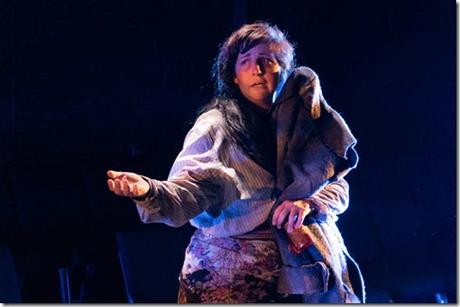
The setting for Red Theater's Sickle is somewhere in the Ukraine, a country made of generations upon generations of farmers, a country known as the "breadbasket of Europe". The period is the years 1932 and 1933. Joseph Stalin, then the leader of the USSR, wants hegemony over this proud nation that was once within the sphere of the Czars' control. He also wants to collectivize the farms for greater production. The proud Ukrainians people resist. But the USSR needs the grain and food to restore its cities to health after the decimation of WW I and the Russian Revolution. And the USSR has the military strength to back up its demands. Its armies encircle the Ukraine and begin taking the farm production out of the country, squeezing it for all it has, leaving less and less to the Ukrainians, slowly starving the population. Resistance is futile. Resistors are shot or shipped to Siberia. And as the end nears, the play opens.
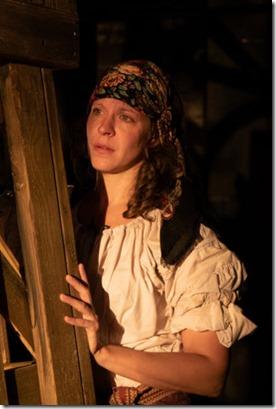
Anna (Moira Begale) has the harried, unkempt look of a mother dealing with unresponsive children. Hair awry, she consoles Iryna (Christine Vrem-Ydstie), a young mother with baby in arms, a little out of her head from time to time with hunger, while also dealing with the loss of her husband. They have taken over an old church for shelter in which the action occurs. The other two Ukrainian women, Yasia (Catherine Dvorak), a tough-talking worker, fond of drink, and Halka (Brittany Ellis) another village woman fighting for her next morsel of food, make up the group of four trying to survive this unsurvivable situation.
Into this caldron of despair, uniformed discipline appears in the form of Nadya, (Katherine Bourne) a bright, educated member of the Komsomol, the Soviet Youth Brigade. She has been sent to oversee that all food grown is properly counted and shipped out of the country, and - more importantly - that production quotas are met. She quotes chapter and verse of the Communist Party line as to how this will improve all lives (which fails to impress starving stomachs). As the tension increases, the women abandon words as solutions and resort to violence, among themselves and with Nadya, as the play proceeds to its tragic end.
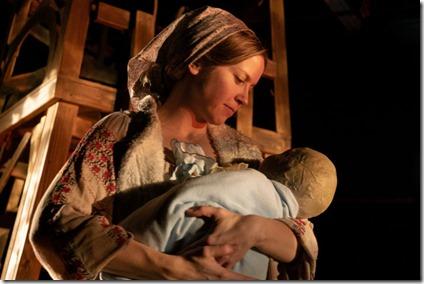
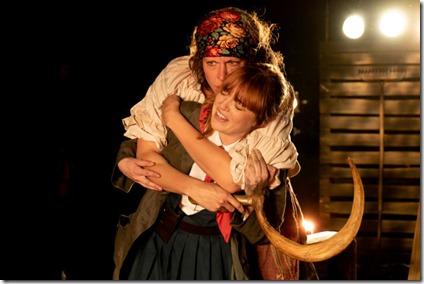
This reviewer had difficulties with three things: 1) the Ukrainian women don't look as if they're starving, no drawn and weary features; 2) too often players were at opposite ends of a long stage making it difficult to hear all the lines, particularly when one or both face away from stage center; and 3) Iryna's baby, which was on view a good portion of the time, was a poorly developed prop and empathy for it was hard to come by.
But the Abbey Fenbert's play is important as it brings to light another horror of a different kind of war, an unwanted assimilation of an entire country's population and production capacity by a wanton dictator. For this historian, it brings additional insight to being aware of how older history can make itself known in the present as Russia. Having recently assimilated the Crimea, Russia is once again trying to envelop Ukraine. As Lord Acton once said, "Those who do not remember their history are condemned to repeat it".
I would urge those of Ukrainian descent, and those who wish to be aware of history and its possible repetition, to bring yourself to this intimate theater and view their offering.
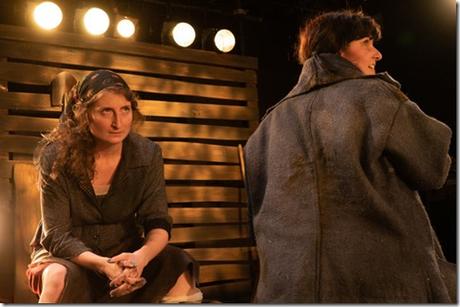
continues through July 29th at Strawdog Theatre, 1802 W. Berenice (map), with performances Fridays and Saturdays 7:30pm, Sundays 4pm. Tickets are $22, and are available by phone (773-644-1380) or online through OvationTix.com (check for availability of ). More info at RedTheater.org/Sickle. (Running time: 95 minutes without intermission)
Photos by M Free Photography
behind the scenes
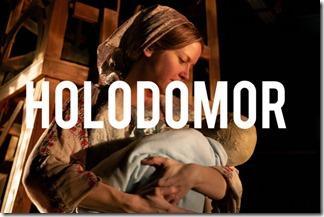
Elizabeth Lovelady (director), Jessie Howe (set, props design), Jason Lynch (lighting design), Sarah D. Espinoza (sound design), Hailey Rakowiecki (costume design), Makena Levine (baby design), Marisa Lerman (producer, executive director), Joey Lubelfeld (producer, managing director), Becca Venable (technical director), Becky Warner (stage manager), Jamie Crothers (production manager), Taylor Pasche (asst. director, dramaturg), Ali Kinsella (Ukranian language and history consultant), Rachel Flesher (violence and intimacy design), Veronica Oczowinski, Tristin Hall (asst. violence and intimacy design), M Free Photography (photos)
Tags: 18-0701, Abbey Fenbert, Ali Kinsella, Becca Venable, Becky Warner, Brittany Ellis, Catherine Dvorak, Chicago Theater, Christine Vrem-Ydstie, Cristiana Park Barbatelli, Duane Barnes, Elizabeth Lovelady, Hailey Rakowiecki, Jamie Crothers, Jason Lynch, Jessie Howe, Joey Lubelfeld, Katherine Bourne, M Free Photography, Maddie Todd, Makena Levine, Marisa Lerman, Moira Begale, post, Rachel Flesher, Red Theater, Red Theater Chicago, Sarah D. Espinoza, Strawdog Theatre, Taylor Pasche, Tristin Hall, Veronica Oczowinski
Category: 2018 Reviews, Drama, Duane Barnes, Red Theater, Strawdog Theatre

